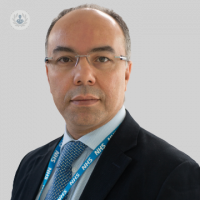Gallstones: your questions answered
Written by:Gallstones can cause various problems including abdominal pain, nausea, vomiting, and jaundice. In severe cases, they can lead to complications such as inflammation of the gallbladder or bile ducts, infection, and pancreatitis. Esteemed consultant surgeon Mr Rajab Kerwat answers any questions you may have about gallstones.

What are gallstones, and what causes them to form in the gallbladder?
Gallstones are tiny, pebble-shaped structures that develop in the gallbladder, a small organ connected to the undersurface of the liver. They consist primarily of a mixture of cholesterol and bilirubin, a component present in our blood.
What are the typical symptoms of gallstones, and when should I seek medical attention for them?
Typical symptoms of gall stones include stomach pain, usually centered around the upper part of the stomach below the rib cage and predominantly on the right-hand side. Patients often perceive the pain to be colic-like, starting gradually and building up into a plateau lasting several hours before gradually disappearing.
This process can take anywhere between an hour to a couple of days or even longer, and the pain tends to be associated with feelings of nausea. In some cases, patients get sick because of the severity of the pain. Additionally, some patients may describe the pain as radiating to the back, between the shoulder blades, or even extending to the right shoulder tip.
Can dietary changes help prevent or manage gallstones, and are there specific foods to avoid?
Unfortunately, dietary changes alone cannot remove existing gallstones. Once gallstones are formed and start causing pain, there isn't anything that diet can do to eliminate them. However, for the majority of patients, eating fatty-rich foods tends to aggravate the symptoms of gold stones and induce a flare-up. Avoiding fatty foods reduces the frequency and intensity of the pain but doesn't make gallstones disappear.
What treatment options are available for gallstones, and when is surgery recommended?
Gallstones are quite common, and fortunately, for the majority of patients, they do not cause any symptoms. If patients are sent for a routine scan for whatever reason and gallstones are detected without any symptoms of pain or sickness, it is not necessary to offer any treatment for that patient. However, as soon as those gallstones start causing pain and the patients start experiencing symptoms, the only available treatment recommended for symptomatic gallstones is surgery. This surgery involves removing the gall bladder and the stones laparoscopically.
Are there any lifestyle changes or habits that can reduce the risk of developing gallstones?
Unfortunately, it's unknown if there are any dietary or lifestyle habits that influence the formation of gallstones. Nevertheless, it is universally advised for individuals to maintain a healthy lifestyle, including a diet rich in fibre, low in fat, and high-water intake, along with a regular weekly exercise routine. However, there is no conclusive evidence to suggest that adhering to these practices can prevent the formation of gallstones, therefore this aspect remains unexplored in scientific research.
If you are suffering from gallstones and would like to book a consultation with Mr Kerwat, do not hesitate to do so by visiting his Top Doctors profile today.


